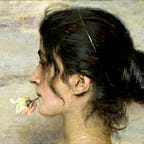The Devil cries
(trad. Ilaria Bianchi)
The Devil?! In Therapy?! “What is it?”, I ask my partner. “It’s Lucifer!”, she answers me
with a bored-and-amused-tone. We start to watch it together. A fantasy plot with some
crude images of an almost ecstatic realism. A hyperbole that best describes the reality of
many neorealisms. The King of Hell is not only on a vacation but finds himself in search
of his own self. Here, the allegory begins.
It all starts when we relax. When, having nothing else to do, we start to look inside
ourselves. It is not granted. Every day people think things, actions, abstractions outside
themselves, being it in time, in space or in alterity. Nothing has changed in the quarantine.
A bit of bewilderment in the first days, then everyone started again chasing after possible
futures, rethinking at stormy pasts, trying to not waste time and making progresses with
jobs. Whoever stops is doomed!
The break taken by Baphomet alarms everyone. The first entities who do not want to
adjust to his choice are his “beloved”; his angelic brothers, the demon that follows him, his
mother. It often happens that we don’t feel understood by those who are close to us. The
apotheosis is precisely when our path no longer coincide with their expectations. Looking
inside oneself is scary and they are the first ones to feel it telling you, “You need some
help.”
The key character of the TV series appears: Linda, the psychotherapist. Lucifer is a big
psychoanalytic session in search of one’s self, why one’s identity and how our own
thoughts can literary help us to grow. The ethical nature is precisely this, identification,
acceptance, forgiveness of oneself and others and change through the ever-present free
will. The doctor embodies the right path, the overcoming of fear, the knowledge of one’s
own limits, the externalization of feelings, the overcoming of prejudices, the trust in
others, the absence of judgement and the constant finding of a new balance.
She takes all the main characters by the hand, putting them in contact with their true
nature, dwelling at decisive moments and letting go in others. Morningstar, the surname
chosen by the fallen angel, discovers his true self. Cloe find herself frail and overcomes
her beliefs and fears; and so does Charlotte, Amenadiel and Mazikeen the demon who
follows the devil in this “trip” to Los Angeles. Sorrow is the thread of these transformations. The absurd pain coming from identifying and accepting who we are with
all our ugliness. Those who do not do it have a tragic destiny in the series.
Dan, “Detective Douche” cannot evolve while continuing to change and suffer. His
suffering, even though it’s tragic, is void. He learns nothing; he flees the confrontation
with Linda; he continues to move from one stimulus to another. His actions, either good or
bad, turn out to be void. He always does them as a reaction to an event. He never stops to
think; to reflect on his true nature. He flees the sorrow that chases him, exaggerating
everything he feels. A flood perpetrated by him that sweep him away every time.
Resilient, he learns little from his past because he is of course a bit stronger, but at the
same time more and more confused.
Following this allegory, people around us are almost all Dan. They carry on their lives,
they never stop working, they chase a void dream, accepting their destiny without
questions and with frustration; they are envious of those who do something else in life.
Either they superficially absolve or do not forgive themselves. They harbor anger, sorrow
and cowardly remain in their comfort zone. They delude they are changing because their
life theater changes, because different tragedies happen. They get lost trying to look
outside for the answer to their intimate questions.
Those who look inside will certainly find themselves to be different from what they have
always thought they were, but meanwhile they treat themselves as devils when it’s only an
angel that has taken another path. The tear that wash away the sorrow of one’s own
existence puts out the fire of hell torment that we arise.
